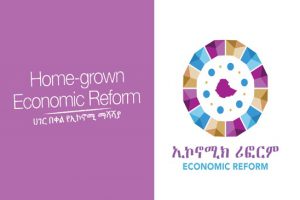
Afri-Exim Bank has recently signed an agreement with the National Bank of Ethiopia (NBE) to provide a loan as big as one billion USD. The secured finance surely stimulates the Ethiopian economy which is enduring the impacts of COVID-19 and the conflict in the country’s north among other factors.
Sectors that can play crucial role in taking the national economy one step forward will get access to the loan from Afri-Exim Bank. In the first round of the loan scheme, one billion Dollars will be disbursed to key sectors through different local, public and private commercial banks.
According to NBE’s Governor Yinager Dessie (Ph.D), sectors that have engaged in social protection and economic growth, job creation and poverty reduction would access the secured finance. The loan scheme supports the homegrown economic reform which has been implemented in the last three years.
He further said that engaging in feasible economic sectors enable to achieve economic growth. Yinager further said that the agreement would not only facilitate condition to access the said finance, it also encourages trade among African countries through trans-border business.
The Afri-Bank as it belongs to Africa, it supports trade and business in the continent and in this regard the agreement highlights the vitality of Ethiopia’s role in meeting the loan’s objectives. In line with these efforts, the Bank announced that it is going to open its branch in Addis Ababa.
The Bank also agreed to provide hard currency for the importation of inputs which are pertinent for agricultural, manufacturing and other sectors’ production activities. On the occasion of the signing agreement, the Afri-Exim Bank President and Board Chairman Professor Benedict Armah said that the agreement creates various opportunities to stimulate business. He further said that though Ethiopia was struggling with the COVID 19 in the last two years, it was able to register some sort of economic growth.
Hence, the Bank believes that encouraging the country enables to keep the momentum of the economic performance. The loan schedule also facilitates loan for firms engaged in export and import trade.
Per the professor’s argument, the accord enables to enhance investment flow, improve productivity of selected sectors, support small-scale business, agroprocessing, tourism and related firms. It also strengthens the finance corporate
sectors and enables to achieve economic growth in a sustainable manner. Through its loan provision and consultation service, it benefits the nation’s industries, various trading activities and facilitates the continent’s emerging free-trade agreement.
As to Benedict, the free-trade agreement can take off Ethiopia and African countries to the better future and the creation of African market brings better opportunity to all. He further said that, though the African Growth Opportunity Act/AGOA/ brought better chance to industries which creates job opportunity to thousands and build their capacity, the African Free Trade Agreement by itself creates job opportunities and market to 1.2 billion people which highly surpassed the AGOA.
It also enhances export trade therefore, paying special attention to the agreement is essential. “To ensure economic growth based on strong, stable and sustainable financial system making cooperative agreement with banks is essential. And to realize it, the bank is prepared to work with various local banks.” said Benedict. According to the agreement, the Ethiopian Commercial banks will work together with other African banks and in such a way they could get support.
The president also mentioned that in Ethiopia opening of letter of credit which is the procedure to obtain hard currency from banks for import-export trade is very cumbersome and many businesspeople show reluctance to go to banks to secure currency therefore, the Afri-Exim- bank is expected to play crucial role in smoothing the procedure and easing business.
As it is known in the past, it was very hard to exchange goods with local currency on the border trade but now the Exim Bank brought solution and resolves inconsistency in trade.
As to the Bank’s President, the cumbersome situations countries face in border trade will be resolved through the African market facilitated by the Afri-Exim Bank which is part of the agreement.
Through the pan-African payment system the Ethiopian commercial banks can use Birr for commodity transaction on cross-border trade. The other trade partner who comes from the other side of the border also uses his/her local currency for payment.
The agreement also enables to increase the volume of trade boosting cross-border businesses and introduces viable payment system and to that end the necessary information prepared by the Afri-Exim Bank will be availed to the Ethiopian commercial banks.
To implement such payment in a proper manner according to Professor Benedict, the Afri Exim Bank expected the National Bank of Ethiopia to be a member of the pan African “payment and settlement system” and abided by other legal frame works.
The governor Yinager on his part also expressed his resolute stance to implement the agreement. He also said that the agreement will be implemented in three years. NBE will deliver its responsibilities to meet the goal in close consultation with pertinent Afri-Exim Bank officials. Particularly to resolve the rampant shortage of hard currency in banks, the Bank will play crucial role in this regard.
In the past due to various reasons the relation between Ethiopia and the AfriExim Bank was not exemplary, but now to reinvigorate and strengthen the relation, the two parties expressed their resoluteness.
Ethiopia is a founding member of Afri- Eim Bank and a shareholder. The government for long has endeavored to achieve economic growth through prioritizing various sectors such as agriculture, manufacturing and services. To facilitate economic growth the county has embarked on various projects such as roads, rail and power.
As the result, for the last two decades, it has been able to register a double-digit economic growth. For the implementation of the development schemes, the government drew finance from local and foreign sources.
When it implements huge projects which are beyond its financial and technological capacity, it resorted to obtain from bilateral and multilateral sources in the form of loan. Still agriculture is the main stay of the economy and it supply food to local market and inputs for the manufacturing firms.
The sector is also a source of export earnings. Agricultural products are still being exported in the raw form with no value addition which intern affects its market competency. According to the Ministry of Trade and Regional Integration report, Ethiopia annually earns 3 billion US Dollar from export while it imports worth of 15 billion Dollar goods.
Hence to balance the deficit it took loan from foreign sources as a way out. In fact currently Ethiopia is categorized as highly indebted poor country. It is also categorized as a country with the capacity to pay its borrowed money.
If the borrowed money effectively and efficiently utilized, it contributes for economic growth. But in the past during the past three decades, the loan secured from various sources as was looted and secretly deposited in the western banks.
Currently, the government showed its resoluteness to allocate resources cautiously in a transparent manner.
BY ABEBE WOLDEGIORGIS
The Ethiopian Herald 15 February 2022




